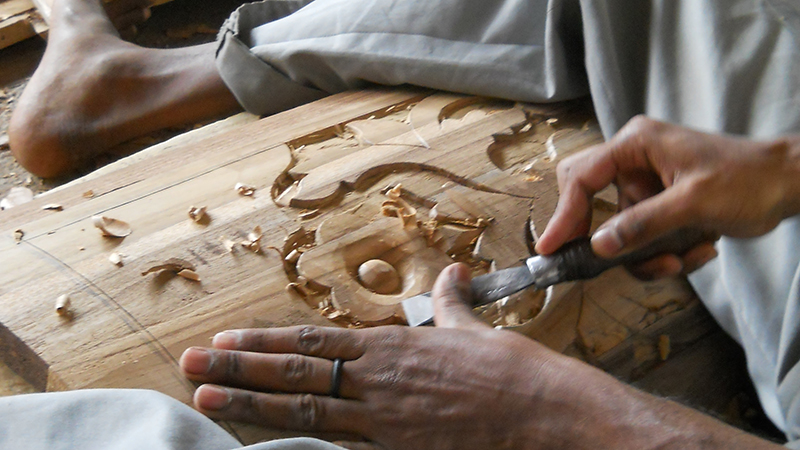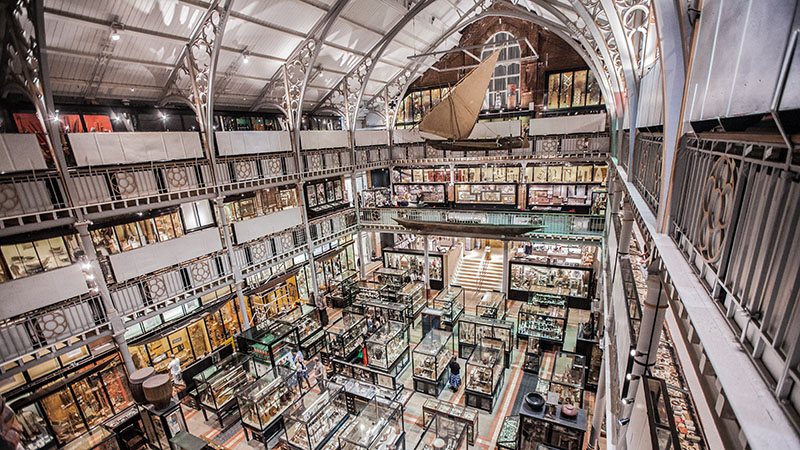There are many resources available to expand your horizons as both an anthropology student at Brookes and as a graduate.
Anthropology resources
Anthropology teaching at Oxford Brookes is research-led and guided by world-class published academics. Our undergraduate students actively participate in research by engaging in staff projects, by working with staff at field sites, and by attending local and international conferences. We are committed to a ‘students as researchers’ approach and provide opportunities throughout the course for students to conduct their own fieldwork.
Depending on your research interests, you will be supported to develop your research skills in a variety of ways. You might opt to pursue guided training in ethnographic methods involving qualitative modes of enquiry such as participant observation and long-term engagement. You could focus on skills in lab sessions covering areas such as osteology, paleopathology, palaeontology and primate anatomy. Alternatively, you can opt for training in fieldwork focused on archaeological techniques, wildlife monitoring or conservation. We also encourage students to work across skillsets in order to develop more novel approaches to fieldwork and data collection.
Previous student projects has covered topics such as refugee rights, migration, ancient tool use, sociality in highly diverse urban spaces, LGBTQ+ identities, impacts of social media, primate conservation and the evolution of diseases.
We also encourage students to publish their research. Biological anthropology staff produce an ISSN registered journal Canopy, reporting on the latest primatology research, including excellent student work. Students of the year-three Social Anthropology modules, Culture & Care and Subjectivities & Social Transformation can reach a global audience by publishing work in collaborative or individual public blogs.


While you’re a student here you will have access to the Anthropology and Geography Labs, a wet laboratory for analysis of hormones and other biological material, the hand-crafted Japan Room, and the social science’s department’s collaborative workspace. Brookes is also home to a sound laboratory and a fieldwork equipment lending service.
Oxford is a unique city in which to be an anthropology student, and you will be able to visit the world-renowned Pitt Rivers Museum, Oxford Natural History Museum, and Ashmolean Museum. In your final year you will have the opportunity to use the Bodleian Libraries to support your dissertation studies.
Fieldwork has always been the central method of research for both social and biological anthropology. Developing the skills required to conduct meaningful, rigorous and innovative fieldwork is, therefore, an essential learning outcome of our program. Our three-day, first-year residential field trip to Avebury Stone Circle provides you with a fantastic opportunity to develop these skills in collaboration with staff and other students. It is also a great chance to get to know each other and build a sense of community with peers and lecturers.
Twycross Zoo houses the largest collection of primates of any zoological collection in Europe. Since 2019, Oxford Brookes University has been working together to build on Twycross’ conservation outreach programmes through student and staff projects. Using a novel mixed methods approach, we are engaging with a new vision of the zoo's role in deepening understanding of the barriers and opportunities involved in creating a sustainable future.
On an annual visit to the zoo, students will learn how to observe animal behaviours and collect systematic data to address research and conservation questions. They also will meet with zoo staff to understand the workings of the zoo, details of animal care, and gain insight into the zoo's conservation vision. The zoo also makes available an annual list of projects for which students can apply to do research for independent studies or dissertations.
Alongside field trips students benefit greatly from time spent living in a culture that is different from their own. Studying abroad is a popular option for anthropology students in their second year. In recent years, students have studied in Malta, Iceland, and the Netherlands through the Erasmus Programme. Others have studied at universities across Canada, Australia and the US.
Our lively, student-led Anthropology Society provides a wonderful opportunity for students to develop their own space and create events and activities. The society regularly hosts talks from staff and others, and organizes social events for students.
Extend your knowledge and your own research by engaging with our research groups, clusters and events:
The Centre for Environment and Society is home to a wide range of innovative research. Based in the School of Law and Social Sciences, it brings together expertise from a diverse range of disciplines. The research centre incorporates three groups:
- Human Origins & Palaeo Environments (HOPE)
- Space & Temporalities (S&T)
- Humans, Animals & Environment (HEA).
All three research groups and the CES centre offer various talks, seminars and workshops that are open to undergraduate students, providing an opportunity to engage with the latest cutting edge research.
Seminars run on Monday’s throughout the teaching period. Recent seminars have explored the pet Lemur trade in Madagascar, Asian ape conservation management, and the role of human primates in our global ecosystem.
Regular seminars from the Europe Japan Research Centre (EJRC) have run each year since 2001, and feature international experts on Japanese culture and contemporary society. EJRC has become a home for researchers in Japanese Studies across the Faculty of Humanities and Social Sciences with a wide range of research expertise, including Japanese cinema, linguistics, language pedagogy, religions of Japan, modern Japanese history, and contemporary Japanese culture. Anthropology students with an interest in learning about Japan regularly attend the centre’s events.
Situated within the Centre for Global Politics, Economy and Society (GPES), this is an interdisciplinary group which focuses on the empirical and theoretical investigations into multiple facets of cultures, identities and divisions. The interests of the group span personal, collective, national/global identity formations and interrogate the dynamics of power, capitalism, spatiality, temporality, inclusion, exclusion, agency and ethics. Many of the groups events are open to students from anthropology and other subjects.
In addition to events organised through the research centres and groups listed above, the School of Law and Social Sciences also hosts larger subject related conferences or workshops. Students are also encouraged to take the lead in organising activities in order to further their research interests. Additionally, students can present their research at the university’s annual Student Research Conference hosted through our ‘Get Published’ initiative.
